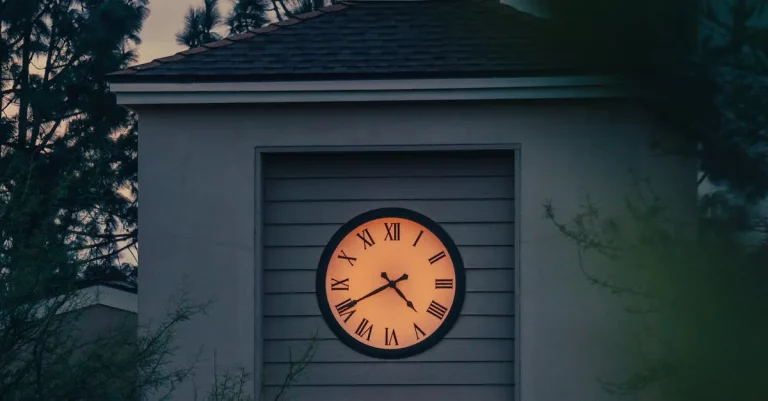Is Chicago Humid In The Summer? Understanding Midwest Heat
Chicago is known for its extreme winters, but summer in the Windy City can be equally intense. High temperatures and humidity combine to create sweltering conditions. So how humid does it actually get?
If you’re short on time, here’s a quick answer: Yes, Chicago experiences high humidity in the summer, averaging around 75% from June through August. This humidity, coupled with summer highs in the 80s and 90s°F, creates hot, muggy conditions.
In this comprehensive guide we’ll cover:
Chicago’s Average Summer Humidity Levels
When it comes to summer weather in Chicago, one cannot ignore the impact of humidity. The city experiences warm and humid summers, making it a challenging season for those who prefer a drier climate. On average, the humidity levels in Chicago range around 75% during the months of June to August.
Morning and night humidity higher
While the average humidity level remains at 75%, it’s important to note that the humidity can vary throughout the day. In the mornings and evenings, the humidity tends to be higher, creating a sticky and uncomfortable feeling.
This can make it harder to enjoy outdoor activities or find relief from the heat.
Measuring dew point and heat index
To get a more comprehensive understanding of the humidity in Chicago during the summer, it’s helpful to look at other factors such as the dew point and heat index. The dew point is the temperature at which the air becomes saturated and forms dew.
Higher dew points indicate higher levels of moisture in the air, resulting in a more humid environment. The heat index takes into account both temperature and humidity, giving a better indication of how hot it actually feels.
According to the National Weather Service, Chicago’s average dew point during the summer months ranges between 60°F to 70°F, indicating a significant level of moisture in the air. This, combined with high temperatures, can make for a muggy and uncomfortable summer experience.
Understanding the humidity levels in Chicago during the summer can help individuals plan their activities and make necessary adjustments to stay comfortable. Whether it’s seeking air-conditioned spaces, staying hydrated, or dressing appropriately, being prepared for the humidity can make the summer months more enjoyable.
For more information on Chicago’s weather patterns and current humidity levels, visit the National Weather Service website.
Weather Patterns Causing Summer Humidity
Chicago, known for its diverse weather patterns, experiences high levels of humidity during the summer months. Several factors contribute to this humid climate, including warm southern air masses, the city’s proximity to Lake Michigan, and its inland continental location.
Warm southern air masses
During the summer, Chicago often experiences the influx of warm air masses from the south. These air masses, originating from the Gulf of Mexico, bring with them high levels of moisture. As the warm air interacts with the cooler air over the city, it creates the perfect conditions for humidity to build up.
This phenomenon is known as the Gulf of Mexico Effect, which is responsible for the increased humidity levels in many parts of the Midwest. The warm and moist air from the Gulf of Mexico clashes with the cooler air from the northern regions, resulting in humid conditions that can be felt in cities like Chicago.
Proximity to Lake Michigan
Another factor contributing to Chicago’s summer humidity is its proximity to Lake Michigan. The lake acts as a moisture source, releasing water vapor into the air. When the wind blows from the east, it carries this moist air towards the city, further increasing the humidity levels.
The lake breeze effect is particularly prominent during the summer months, when the temperature difference between the lake and the land is significant. This temperature contrast creates a convectional circulation pattern, with the cooler air from the lake replacing the warmer air over the city.
As a result, the humidity levels rise, making Chicago feel even more humid during the summer.
Inland continental location
Chicago’s inland continental location also plays a role in its summer humidity. Unlike coastal cities, which benefit from the moderating influence of the ocean, Chicago is situated in the heart of the continent.
This means that it experiences extreme temperature variations throughout the year, including hot and humid summers.
Without the cooling effect of the ocean, the warm air that moves across the continent accumulates moisture from various sources, leading to increased humidity levels. Additionally, the lack of natural barriers allows weather systems to move freely across the region, bringing in moisture and contributing to the humid conditions.
Understanding these weather patterns can help residents and visitors prepare for the summer humidity in Chicago. It is advisable to stay hydrated, wear lightweight and breathable clothing, and seek shade or air-conditioned spaces when necessary.
Despite the humidity, Chicago has much to offer in terms of attractions and activities, making it a vibrant summer destination.
Most Humid Times and Microclimates
When it comes to humidity in Chicago during the summer, there are certain times of the day that tend to be more humid than others. One interesting fact is that early mornings often see the highest levels of humidity.
This is because the cool nighttime temperatures cause moisture to condense, resulting in higher humidity levels in the morning. So, if you’re planning outdoor activities, you might want to schedule them for later in the day when the humidity tends to decrease.
Early morning humidity highest
In Chicago, the early morning hours between 4 am and 7 am are typically the most humid. This can be attributed to the overnight condensation and lack of sunlight to evaporate the moisture. If you’re an early riser, you might notice the sticky feeling in the air during these hours.
It’s important to stay hydrated and take precautions if you’re planning to be outside during this time.
Lakeside neighborhoods more humid
Living near the lakeshore in Chicago can have an impact on the humidity levels you experience. The proximity to Lake Michigan can create a microclimate that tends to be more humid compared to areas further inland.
The lake breeze brings in moisture from the water, resulting in higher humidity in lakeside neighborhoods. So, if you live in or plan to visit areas like Lincoln Park or Lakeview, be prepared for a bit more humidity.
Nighttime relief
While the early morning hours can be quite humid, there is some relief that comes with the night. As the sun sets and temperatures drop, the humidity levels also tend to decrease. This can make the evenings more comfortable for outdoor activities.
So, if you’re looking to beat the heat and humidity, consider planning your outings for the late afternoon or evening when you can enjoy cooler temperatures and lower humidity.
Understanding the most humid times and microclimates in Chicago can help you better prepare for the summer heat. Whether you’re an early bird or a night owl, knowing when to expect higher humidity levels can make a difference in your comfort levels.
So, next time you’re enjoying the Windy City in the summer, keep these tips in mind and make the most of your time in the Midwest heat.
Impact of Climate Change on Chicago Humidity
Climate change is having a significant impact on the humidity levels experienced in Chicago during the summer months. The combination of rising temperatures and changing weather patterns is leading to more frequent heat waves, higher nighttime lows, and longer periods of humidity.
More frequent heat waves
One of the most noticeable effects of climate change on Chicago’s humidity is the increase in the frequency of heat waves. Heat waves, defined as prolonged periods of excessively hot weather, are becoming more common in the Midwest region.
These heat waves not only bring high temperatures but also elevated humidity levels, making the summer months in Chicago feel even more uncomfortable.
Higher nighttime lows
Another consequence of climate change is the rise in nighttime temperatures. While it may seem counterintuitive, higher nighttime lows contribute to increased humidity levels during the summer. As temperatures fail to cool down as much overnight, the air retains more moisture, resulting in higher humidity levels.
This can make it difficult for residents of Chicago to find relief from the heat, even during the nighttime hours.
Longer humidity duration
Climate change is also prolonging the duration of humidity in Chicago during the summer months. As global temperatures rise, the warm air becomes capable of holding more moisture. This extended period of high humidity can have detrimental effects on human health, leading to increased discomfort, difficulty breathing, and exacerbating respiratory conditions.
According to a study conducted by the Climate Central, Chicago has experienced a noticeable increase in humidity levels over the past few decades. This is consistent with global climate change trends, which show a general increase in humidity levels worldwide.
As the Earth’s climate continues to warm, it is likely that Chicago’s humidity will continue to rise, making summers even more uncomfortable for residents.
It is important that individuals and communities take steps to adapt to these changing humidity levels. This can include staying hydrated, seeking out air-conditioned spaces, and reducing outdoor activities during the hottest and most humid parts of the day.
Additionally, efforts to mitigate climate change through reducing greenhouse gas emissions and promoting sustainable practices can help alleviate the long-term effects of increased humidity in Chicago and other affected regions.
Coping with Chicago’s Humid Summer Heat
Stay hydrated
One of the most important things to remember when coping with Chicago’s humid summer heat is to stay hydrated. The high humidity levels can make you sweat more, leading to increased fluid loss from your body. Make sure to drink plenty of water throughout the day to keep yourself hydrated.
It’s also a good idea to avoid excessive consumption of alcohol and caffeinated beverages, as they can contribute to dehydration.
Time outdoor activities carefully
When the summer heat and humidity in Chicago become too intense, it’s essential to plan your outdoor activities carefully. Try to schedule your outdoor excursions for the early morning or late afternoon when temperatures are cooler.
This way, you can avoid the peak heat hours of the day and reduce the risk of heat-related illnesses. Additionally, wearing lightweight and breathable clothing can help you stay more comfortable while outdoors.
Take cooling breaks
During the hot and humid summer days in Chicago, it’s crucial to take regular cooling breaks. Find air-conditioned spaces where you can rest and cool down, such as shopping malls, libraries, or cafes. If you don’t have access to air conditioning, consider using fans or cold compresses to lower your body temperature.
Taking frequent breaks from the heat can help prevent heat exhaustion and heatstroke.
It’s important to remember that everyone’s tolerance for heat and humidity varies. Some individuals may find Chicago’s summer heat more challenging to cope with than others. If you have any underlying health conditions or concerns about the heat, it’s always a good idea to consult with a healthcare professional.
For more information on coping with summer heat and humidity, you can visit the Centers for Disease Control and Prevention (CDC) website. They provide valuable tips and resources to help you stay safe in extreme weather conditions.
Conclusion
Chicagoans should brace for hot, humid conditions each summer. While the Midwest heat and humidity may be draining, taking proper precautions can keep you healthy and comfortable.
Understanding Chicago’s climate patterns and learning to manage humidity levels is key to enjoying the city’s summertime activities and energy.








